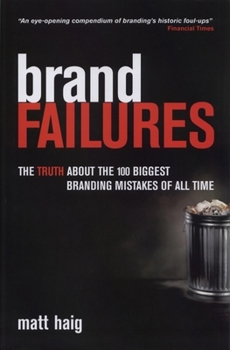Brand Failures: The Truth about the 100 Biggest Branding Mistakes of All Time
Select Format
Select Condition 
Book Overview
What do Coca-Cola, McDonald's, IBM, Microsoft and Virgin all have in common? Yes, they are all global giants, but what they are less recognized for are the many branded products they have launched... This description may be from another edition of this product.
Format:Hardcover
Language:English
ISBN:0749439270
ISBN13:9780749439279
Release Date:May 2003
Publisher:Kogan Page
Length:310 Pages
Weight:1.35 lbs.
Dimensions:1.1" x 6.4" x 9.4"
Customer Reviews
4 ratings
Yeah, "New Coke" Probally Wasn't The Best of Ideas In The World
Published by Thriftbooks.com User , 16 years ago
Non-fictional books are never useless. The only difference in its productiveness is how much information you can glean, whether it be how to do, or not to do. And in this book, there is much to glean, however, there are also parts that miss their marks. "Branding Failures" is about failures in business, which is always great to study, as to not to repeat history. Each of the 100 cases looks at a business failure (classic, idea, extension, PR, cultural, people, rebranding, tired brands, and E-Failures) its story, and it's reason for failure. Each conclusion is mostly logical, even with a little help. In fact, not a case goes by where the author does not cite, or use another's writers explanation. Chiefly mentioned is the classic market manuel "The 22 Immutable Laws of Marketing," and authors Jack Trout and Al Ries. However, there's a point where these sources are cited so often, you're left wondering, 'why not just buy their book?' However, a book examining all these failures in one place differentiates itself from others, in addition to the great advice is gleaned from it. The author himself even adds some great advice every once in a while. Also keep in mind that the author is of the UK, so there are a few companies that haven't crossed the pond, or are just local. For example, there's a London nightclub, and a few other British companies. So, there is a bit of a cultural barrier in understanding a few of the companies. It's also written in British grammar, so percent is written "per cent," and words will be spelled a bit differently. But the vocabulary is pretty comprehensible. While books like "22 Immutable Laws of Marketing" primarily go into the principles of marketing, and only bring specific companies up as examples in aid to their teaching, "Branding Failures" goes in depth into why the case failed. While the book could have been better, it's still very informative, and it's at least worth a trip to the library.
Very interesting
Published by Thriftbooks.com User , 16 years ago
It is always good to know about brand failures. This is an excellent not-to-list that every marketing manager should read. I consider very wise to have a copy of this book on your desk. Furthermore, it is pretty fun to read.
Invaluable case study examples of branding in the trenches
Published by Thriftbooks.com User , 18 years ago
This book is worth perusing, if only for the very large number of vivid examples of branding success and failure. Some of the underlying principles are open to critique, most notably the authors assertion that perception determines buyers decisions rather than product traits. Many would say that `perception' is, of course, determined to a large extent by the customer's relationship to the product's traits. However, Haig is on track in so many other areas, and the case examples are so valuable, that the book is worth a look anyhow. Branding can be such a confusing, abstracted issue, that the concrete examples here can provide a much needed reality-check.
Highly Recommended!
Published by Thriftbooks.com User , 20 years ago
Branding is a ubiquitous, but critical marketing function that can produce spectacular successes and catastrophic blunders. Highly visible branding failures, such as the ill-fated "New Coke" or Harley Davidson's silly attempt to peddle perfume, are first-order marketing blunders. Yet, while branding is critical, one wonders if branding alone, as author Matt Haig asserts, is the main reason Land Rover sales declined and General Motors stopped making Oldsmobiles. Other experts might address such failures from a more expansive perspective, citing financial, competitive, managerial, global and environmental factors. Haig notes that non-branding mistakes contribute to failure, but focuses on branding as the prime cause. As a result, his brand-centered explanations can seem strained, but he overcomes this concern with a long list of vignettes that effectively drive home important points about the causes of branding failures. We suggest this book to marketing, advertising, PR and customer service managers so they can learn from other people's mistakes.






